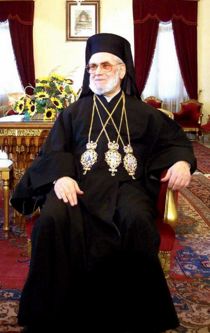Ignace IV (Hazim) d'Antioche : Différence entre versions
(endormi dans le Seigneur) |
|||
| Ligne 40 : | Ligne 40 : | ||
[[es:Ignacio IV (Hazim) de Antioquía]] | [[es:Ignacio IV (Hazim) de Antioquía]] | ||
[[ro:Ignatie IV (Hazim) al Antiohiei]] | [[ro:Ignatie IV (Hazim) al Antiohiei]] | ||
| + | [[pt:Inácio IV (Hazim) de Antioquia]] | ||
Version du 28 décembre 2012 à 10:48
Sa Béatitude le Patriarche Ignace IV (né Hazim) a été patriarche d'Antioche et de tout l'Orient, primat de l'Église d'Antioche entre 1979 et 2012.
Patriarche d’Antioche, Ignace IV, né en 1920 en Syrie, a été le 170ème patriarche d’Antioche, successeur de Saint Pierre, premier évêque d’Antioche. Il s'est endormi dans le Seigneur le 5 décembre 2012.
Le Patriarche Ignace IV a été co-président du Conseil Œcuménique des Églises et a fondé l'Université de Balamand (Liban).
Vie
| Cet article (ou bien des fragments) est proposé pour être traduit en français!
Si vous désirez assumer la traduction (partiellement ou intégralement), annoncez svp cela dans la page de discussions de l'article. |
Ignatius was born in 1921 in the village of Mhardey (Mhardeh) near Hama in Syria. He is the son of a pious Arab Orthodox family and from an early age was attracted to service within the Church. While studying in Beirut, Lebanon, for a literature degree, he entered the service of the local Orthodox diocese, first by becoming an acolyte, then a deacon. In 1945 he went to Paris where he graduated from the St. Sergius Orthodox Theological Institute. From his time in France onwards he has been moved not only by a desire to pass on the deposit of the faith, but also to take Orthodoxy out of its unhistorical ghetto by discovering in its Holy Tradition living answers to the problems of modern life. On his return to the Middle East, he founded the Balamand Orthodox Theological Seminary in Lebanon which he then served for many years as dean. As dean he sought to provide the Patriarchate with responsible leaders who had received a good spiritual and intellectual training and who were witnesses to an awakened and deeply personal faith.
While his native language is Arabic, he also speaks fluent English and French. He was one of the founders of the active Orthodox Youth Movement of Lebanon and Syria in 1942, through which he helped to organise and lead a renewal of Church life in the Patriarchate of Antioch. The movement worked at the heart of the Church helping ordinary believers to rediscover the personal and communal meaning of the Eucharist through a practice of frequent Communion which had become extremely rare. Following on from this in 1953 he helped to found Syndesmos, the world fellowship of Orthodox Youth and Theological Schools.
He was consecrated to the episcopacy in 1961 and elected Metropolitan of Lattakia in Syria in 1970. His style as metropolitan broke with the former tradition of episcopal grandeur and he inaugurated an authentic practice of frequent communion. On July 2, 1979, under the name of Ignatius IV, he became the Orthodox Patriarch of Antioch, the third ranking hierarch of the Orthodox Church after the Patriarchs of Constantinople and Alexandria. After his election as Patriarch he said:
- I know that I will be judged if I do not carry the Church and each one of you in my heart. It is not possible for me to address you as if I were different from you. No difference separates us. I am an integral part of you; I am in you and I ask you to be in me. For the Lord comes, and the Spirit descends on the brothers gathered, united in communion, as they manifest a diversity of charisms in the unity of the Spirit.
As patriarch he has sought to give a new dynamism to the Holy Synod and seen it name bishops who are close to the people and who are motivated to develop the Church's ecclesial and spiritual life, detached from political factions.
Il s'est endormi dans le Seigneur le 5 décembre 2012.
| Ignace IV (Hazim) d'Antioche | ||
|---|---|---|
| Précédé par: ? |
Métropolite de Lattakia 1971-1979 |
Succédé par: Jean (Mansour) |
| Précédé par: Élie IV (Muawad) |
Patriarche d'Antioche 1979-2012 |
Succédé par: — |
